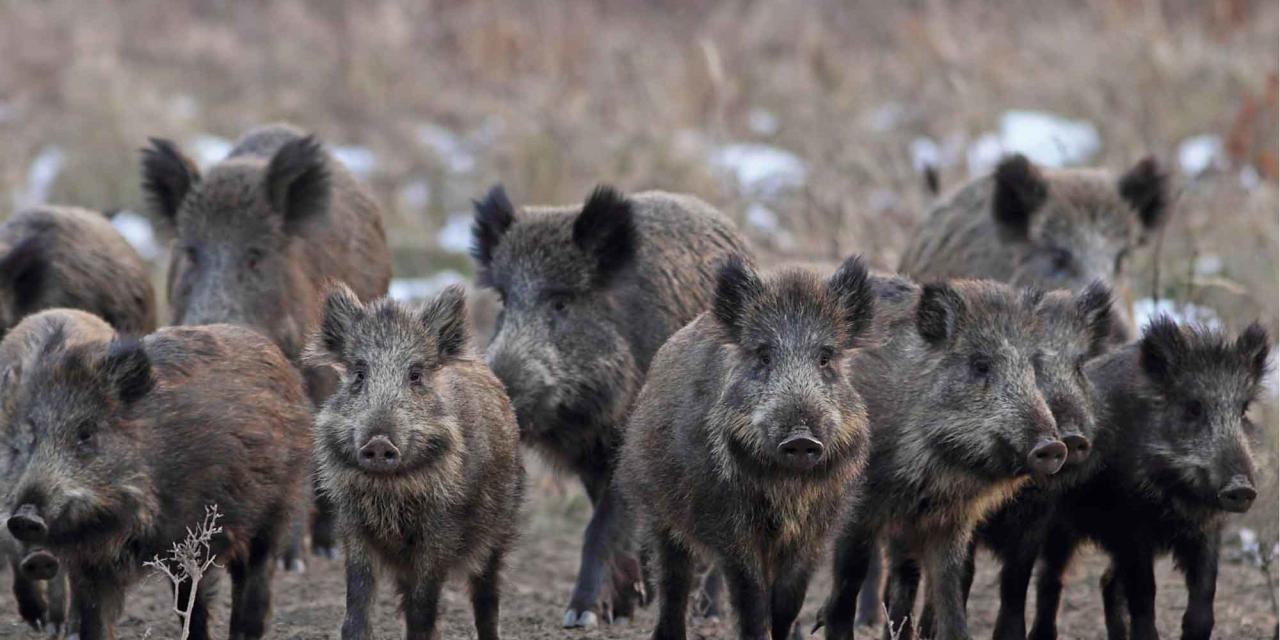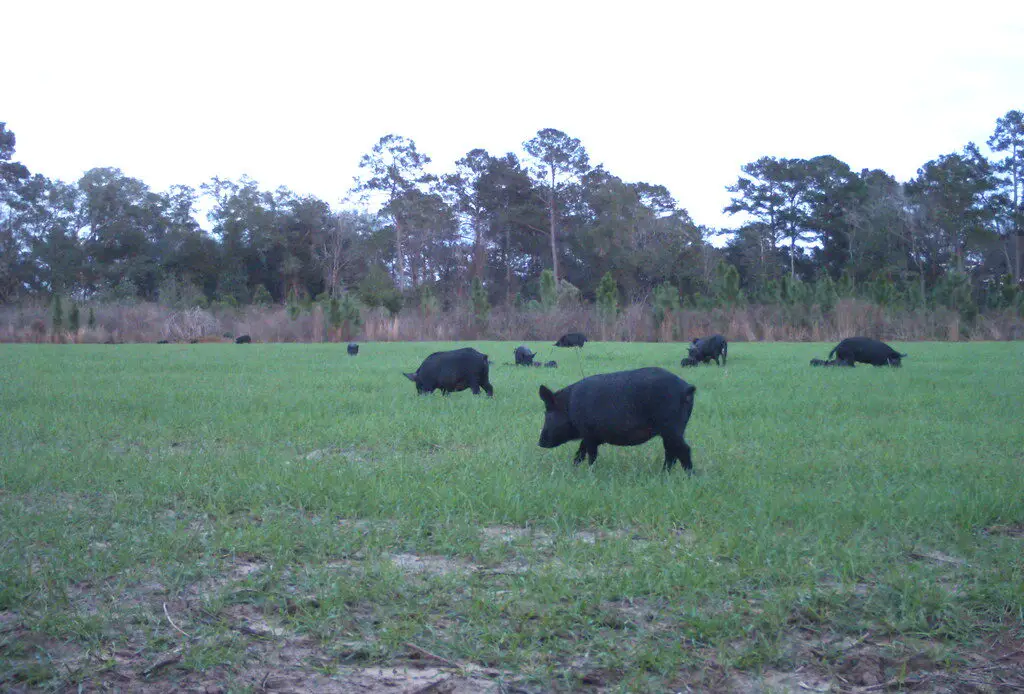Get Paid To Hunt Hogs In Georgia: A Lucrative Opportunity For Hunters
Hunting wild hogs in Georgia is not just a pastime; it’s a lucrative opportunity for skilled hunters. The state of Georgia has been battling an increasing population of feral hogs, which are wreaking havoc on agricultural lands, ecosystems, and infrastructure. As a result, the government and private landowners are offering incentives for hunters to help control the hog population. If you're an experienced hunter or someone interested in pursuing this opportunity, this article will guide you through everything you need to know.
Wild hogs have become a significant issue in many parts of the United States, and Georgia is no exception. These invasive animals reproduce rapidly and cause extensive damage to crops, forests, and water sources. To combat this problem, Georgia has implemented various programs that allow hunters to get paid for hunting hogs. This initiative not only helps manage the hog population but also provides hunters with a chance to earn extra income.
In this comprehensive guide, we'll explore the ins and outs of getting paid to hunt hogs in Georgia. From understanding the rules and regulations to discovering the best hunting techniques, we'll cover everything you need to succeed in this endeavor. Let's dive in!
Read also:Brian Tyler Cohen Husband The Man Behind The Music And Beyond
Table of Contents
- Overview of Wild Hog Problem in Georgia
- The Role of Hunters in Controlling Wild Hog Population
- How to Get Paid to Hunt Hogs in Georgia
- Regulations for Hunting Wild Hogs
- Best Practices for Effective Hog Hunting
- Essential Equipment for Hog Hunters
- Hog Hunting Methods and Techniques
- Opportunities for Hunters in Georgia
- Safety Tips for Hog Hunting
- Resources for Aspiring Hog Hunters
Overview of Wild Hog Problem in Georgia
Wild hogs, also known as feral swine, are one of the most destructive invasive species in Georgia. These animals are highly adaptable and can thrive in various environments, from forests to agricultural fields. The increasing population of wild hogs poses a serious threat to Georgia's ecosystem and economy. According to the USDA, wild hogs cause billions of dollars in damage annually across the United States.
In Georgia, the problem is particularly severe. The state's warm climate and abundant natural resources provide ideal conditions for wild hogs to reproduce and spread. This has led to significant damage to crops, soil erosion, and the destruction of native wildlife habitats. The state government and private landowners are actively seeking solutions to control the hog population, and hunting is one of the most effective methods.
By participating in hog hunting programs, hunters can play a crucial role in mitigating the negative impacts of wild hogs while earning a reward for their efforts.
The Role of Hunters in Controlling Wild Hog Population
Hunters are on the front lines of the battle against wild hogs in Georgia. Their expertise and skills are essential for controlling the population and reducing the damage caused by these invasive animals. The state encourages hunters to take part in hog hunting programs by offering financial incentives and放宽 regulations.
Why Hunters Are Needed
Wild hogs reproduce at an alarming rate, with sows capable of producing two litters per year, each containing 4-6 piglets. This rapid reproduction makes it challenging to control their population through natural means alone. Hunters provide a practical and effective solution by targeting adult hogs and preventing them from reproducing.
- Hunters can remove large numbers of hogs from specific areas, reducing their impact on local ecosystems.
- They help protect agricultural lands by eliminating hogs that destroy crops and cause soil erosion.
- Hunters contribute to preserving native wildlife habitats by controlling hog populations that compete for resources.
How to Get Paid to Hunt Hogs in Georgia
Getting paid to hunt hogs in Georgia is a viable option for skilled hunters. There are several ways to earn income through hog hunting, including working with private landowners, participating in state-sponsored programs, and selling hog meat and by-products.
Read also:Vanessa Johnson
Working with Private Landowners
Many private landowners in Georgia are willing to pay hunters to eliminate wild hogs from their properties. These landowners often face significant damage to their crops and land, making hog hunting a priority. Hunters can negotiate payment rates based on the number of hogs harvested or the size of the land being hunted.
State-Sponsored Programs
The state of Georgia offers various programs that compensate hunters for their efforts in controlling the wild hog population. These programs may include bounties for harvested hogs, equipment loans, and training opportunities. Hunters interested in participating should contact their local wildlife department for more information.
Selling Hog Meat and By-Products
Another way to earn income from hog hunting is by selling the meat and by-products. Wild hog meat is becoming increasingly popular in gourmet cuisine, and there is a growing market for it. Additionally, hunters can sell hog hides, tusks, and other by-products to artisans and manufacturers.
Regulations for Hunting Wild Hogs
Hunters must familiarize themselves with the regulations governing wild hog hunting in Georgia. While the state has relaxed some restrictions to encourage hog hunting, there are still rules that hunters must follow to ensure safety and compliance.
Key Regulations
- Hunters do not need a license to hunt wild hogs on private land with the owner's permission.
- Night hunting is allowed with the use of artificial lights and night vision equipment.
- There is no bag limit for wild hogs, meaning hunters can harvest as many hogs as they can.
- Hunters must report their harvest to the Georgia Department of Natural Resources (DNR) in some cases.
It's important for hunters to stay updated on any changes to the regulations and always obtain the necessary permissions before hunting on private land.
Best Practices for Effective Hog Hunting
To maximize their success and earnings, hunters should adopt best practices for hog hunting. These practices include understanding hog behavior, selecting the right equipment, and using effective hunting techniques.
Understanding Hog Behavior
Wild hogs are intelligent and elusive animals, making them challenging to hunt. Understanding their behavior is crucial for successful hunting. Hogs are most active at night and during low-light conditions, so hunters should plan their hunts accordingly. They also tend to travel in groups, known as sounders, which can make them easier to locate.
Selecting the Right Equipment
Hunters need the right equipment to effectively hunt wild hogs. This includes firearms, ammunition, and hunting gear suitable for the terrain and conditions. Popular firearms for hog hunting include rifles, shotguns, and handguns chambered in high-powered calibers.
Essential Equipment for Hog Hunters
Having the right equipment is essential for successful hog hunting. Here are some must-have items for hunters:
- Firearms: Choose a rifle or shotgun with enough power to take down a large hog.
- Ammunition: Use high-quality ammunition designed for hunting large game.
- Hunting Gear: Invest in durable boots, camouflage clothing, and other gear suitable for the environment.
- Optics: Night vision scopes and thermal imaging devices can enhance hunting success in low-light conditions.
Hog Hunting Methods and Techniques
There are several methods and techniques hunters can use to hunt wild hogs effectively. These include stalking, ambush hunting, and using dogs.
Stalking
Stalking involves quietly approaching hogs on foot and taking a shot from a concealed position. This method requires patience and stealth, as hogs have keen senses and can easily detect hunters.
Ambush Hunting
Ambush hunting involves setting up a blind or tree stand near a known hog trail or feeding area and waiting for the hogs to come within range. This method is effective when combined with baiting or food plots.
Using Dogs
Using dogs to track and corner hogs is a popular method in Georgia. Dogs can locate hogs over large areas and hold them at bay until the hunter arrives. This method requires specialized training and equipment.
Opportunities for Hunters in Georgia
Georgia offers numerous opportunities for hunters to get involved in wild hog control efforts. From private landowners seeking assistance to state-sponsored programs, there are plenty of ways for hunters to make a difference and earn income.
Private Land Opportunities
Private landowners in Georgia are often eager to partner with hunters to control wild hog populations. Hunters can reach out to local landowners or join hunting clubs to gain access to prime hunting areas.
State-Sponsored Programs
The Georgia Department of Natural Resources (DNR) offers various programs to support hog hunters. These programs may include training, equipment loans, and financial incentives for successful hunters.
Safety Tips for Hog Hunting
Safety should always be a top priority when hunting wild hogs. Hunters should follow these tips to ensure a safe and successful hunt:
- Wear appropriate clothing and gear to protect against harsh weather and terrain.
- Carry a first aid kit and know basic first aid procedures.
- Use caution when handling firearms and always follow safe handling practices.
- Be aware of your surroundings and avoid hunting in areas with dense vegetation or steep terrain.
Resources for Aspiring Hog Hunters
There are several resources available for hunters interested in getting paid to hunt hogs in Georgia. These include government agencies, hunting organizations, and online forums.
Georgia Department of Natural Resources (DNR)
The DNR provides valuable information on hog hunting regulations, programs, and opportunities. Hunters can contact the DNR for guidance and support.
Hunting Organizations
Joining a hunting organization can provide hunters with access to exclusive hunting areas, training, and networking opportunities. Many organizations also offer resources and support for hog hunters.
Kesimpulan
Getting paid to hunt hogs in Georgia is a rewarding opportunity for skilled hunters. By participating in hog hunting programs, hunters can help control the wild hog population while earning income and contributing to the state's ecosystem. Understanding the regulations, adopting best practices, and utilizing the right equipment are key to success in this endeavor.
We encourage hunters to take action by reaching out to private landowners, joining state-sponsored programs, and exploring the resources available to them. Share this article with fellow hunters and leave a comment below to share your experiences and tips. Together, we can make a difference in controlling the wild hog population in Georgia!


